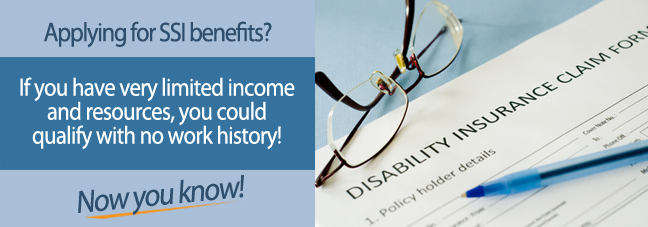If you have a disability that prevents you from working, Social Security can help. The Social Security Administration pays disability benefits to people who can’t work as a result of disability.
Social Security is meant to help with medical expenses and costs of living. Even if you haven’t worked, you can still get benefits in the form of SSI payments, if you have a low enough income to qualify.
Understanding SSI Benefits
SSI stands for Supplemental Security Income. It helps individuals with disabilities who don’t make enough money. Or, if you have a child with a disability and you don’t make enough money, you can receive benefits to help with the care of that child.
There are strict income requirements to qualify for SSI benefits.
Even though the Social Security Administration administers the payments, the funds for SSI come from US Treasury General Funds. This general revenue comes from the income taxes we pay. This is different from FICA taxes because you do not need to pay FICA taxes or earn money to qualify for these benefits. Eligibility is determined based on need.
Income Limits and SSI Funding
Because SSI benefits are need-based, there are strict income limits to qualify. For adults, the income limit is $733 per month for an individual, or $1,033 per month for a couple. If you have a disabled child under the age of 18, there are still income limitations, but they aren’t as severe. Not all of your money is considered income, so you can still qualify for SSI benefits on behalf of your child, even if your income is over the SSA’s monthly limits.
The income limit for SSI benefits is based on something called the FBR, or federal benefit rate. The FBR represents both the SSI income limit and the maximum federal SSI monthly payment. To qualify, your monthly income level must not exceed the FBR. Again, not all the money you receive is considered income.
What counts as income for the SSI income limit? It gets tricky. The SSA overlooks some cash items but then it also considers certain non-cash items to be income.
What’s considered income?
- Money earned from working.
- Unearned income such as veteran’s benefits, child support, and Social Security.
- Support from family and friends in the form of providing food and shelter.
- Some of the income earned by others in your household, such as your spouse.
This is all counted as income for your SSI application purposes.
What’s exempt?
- Medical care.
- Housing, food, and energy assistance.
- Anything given to you that can’t be used to purchase additional food, shelter, or clothing.
- Income set aside for PASS ( Plan for Achieving Self Support).
Applying for SSI Benefits
If you apply for SSI, it can be helpful to get a disability benefit attorney or advocate to aid you in the process. A lawyer can assist you in getting your claim filed, be your official representative, help you appeal if your claim is denied, and help maximize your chances for success in qualifying for disability benefits.
If you have no record of medical treatment for your disability, a disability lawyer is especially helpful. Lawyers also help speed up the application process and the process of appealing your claim if it is denied.
